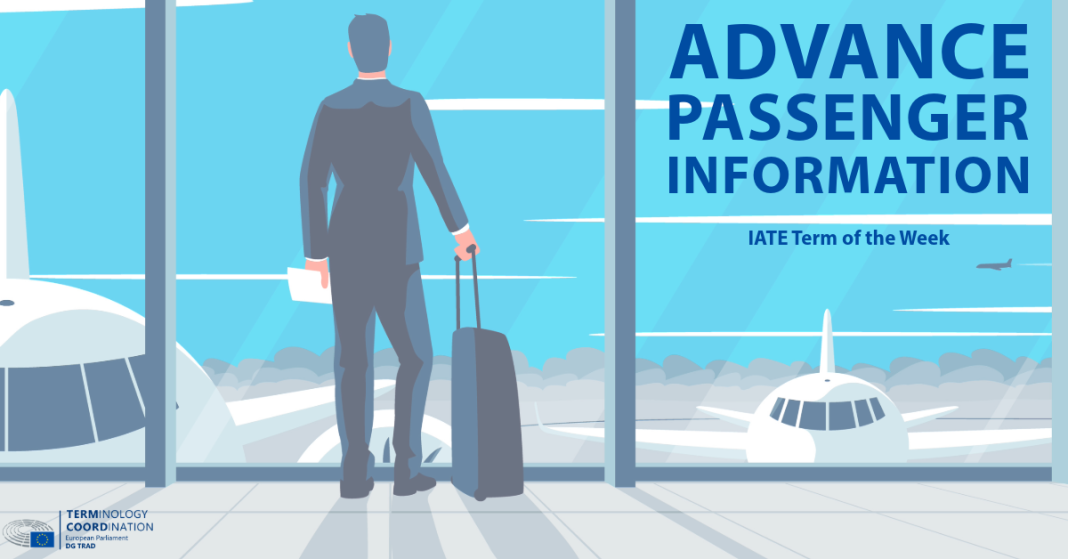API data refers to a compilation of passenger information extracted from travel documents by air carriers during check-in. This dataset includes biographic details and travel route specifics. Typically, API data confirms passenger identities.
Air carriers gather API data during check-in, whether online or at the airport. This information resides within airline systems and is subsequently transmitted to border authorities in the form of a comprehensive ‘passenger list manifest,’ encompassing all travellers aboard departing flights.

Annually, the European Union experiences the transit of over a billion passengers, whether they are arriving, departing, or journeying within its territories. This substantial volume exerts significant strain on the EU’s external air borders, demanding thorough scrutiny of all travellers, be they non-EU nationals or EU citizens, against relevant databases. Effectively managing this influx requires expediting airport border controls while upholding stringent security protocols and facilitating smooth passenger movements. Achieving this delicate equilibrium hinges on the precise, inclusive, and timely utilization of API data.
In December 2022, the Commission introduced two proposals to overhaul the regulations governing the collection and transmission of advance passenger information (API) data. The first focuses on the collection and transfer of advance passenger information (API) for enhancing and facilitating external border controls, while the second focuses on the collection and transfer of advance passenger information for the prevention, detection, investigation and prosecution of terrorist offences and serious crime, and amending Regulation. These proposals aim to supersede the existing directive with two regulations. The Commission seeks to harmonize API data collection requirements, encompassing all air travellers across all flights, enhance the accuracy and comprehensiveness of collected data, and establish a centralized router. This router will serve as the primary point for receiving and distributing data, replacing the current system comprising multiple connections between air carriers and national authorities.
Conclusion
Advance Passenger Information (API) is a crucial strategy aimed at gathering traveller data and other flight details to verify passengers’ identities and ensure safety within European territory. Given its sensitivity, the Commission diligently works to implement and maintain its operations to prevent any breaches or malfunctions. In December 2022, the Commission worked on a set of new proposals with the objective of harmonising and strengthening the accuracy of the collected data.
Bibliography:
https://ec.europa.eu/commission/presscorner/detail/es/qanda_22_7646
Collection and transfer of advance passenger information (API) for enhancing and facilitating external border controls – In “Promoting our European Way of Life”: https://www.europarl.europa.eu/legislative-train/theme-promoting-our-european-way-of-life/file-revision-of-the-advance-passenger-information-(api)-directive
COUNCIL DIRECTIVE 2004/82/EC of 29 April 2004 on the obligation of carriers to communicate passenger data: https://eur-lex.europa.eu/legal-content/EN/TXT/?qid=1539330723694&uri=CELEX:32004L0082
Proposal for a REGULATION OF THE EUROPEAN PARLIAMENT AND OF THE COUNCILOn the collection and transfer of advance passenger information (API) for enhancing and facilitating external border controls, amending Regulation (EU) 2019/817 and Regulation (EU) 2018/1726, and repealing Council Directive 2004/82/EC: https://eur-lex.europa.eu/legal-content/EN/TXT/?uri=CELEX%3A52022PC0729
Written by Marilena Martucci
Born and raised in Fasano, Italy, she developed a deep fascination for linguistics and diverse modes of communication. Her academic journey commenced with a Bachelor’s degree in Linguistics and Intercultural Communication in Bari, followed by advanced studies in Linguistics and Translation in Pisa. Fueled by her passion for Portuguese culture and language, she embarked on two enriching Erasmus experiences in Coimbra and Lisbon. After completing her Master’s degree, she settled in Lisbon, immersing herself in the fields of Journalism and Communication while continuously refining her expertise in languages and translation. Specialising in medical translation, she furthered her academic pursuits by studying Economics and Communication. She transitioned to a career in translation as Schuman Trainee at the European Parliament, focusing on terminology. Beyond her professional life, she enjoys exploring new cuisines, cooking, dancing, and indulging in literature.

